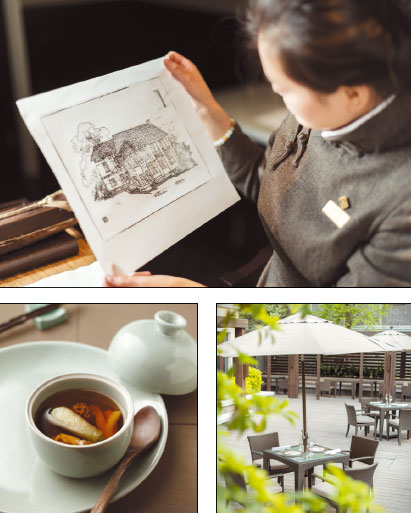A taste of life in 1930s Nanjing
Attention to detail helps boutique hotel transport travelers back in time, Xu Junqian reports in Nanjing.
As Zhu Wenbo calculates figures down to the last decimal point, you would think she was a mathematician rather than a hotelier, or in the words of her colleagues, the kind of hostess that makes you feel like you are staying at a home away from home.
Zhu is the general manager of Yihe Mansions in Nanjing, a recently opened boutique hotel in the capital city of Jiangsu province.
Her calculations are to ensure the hotel is running precisely as it should be.
Shower water is heated within six seconds of turning a tap on, every room is no louder than 35 decibels, which is comparable to quiet whispering in a library, and the wooden floors are kept at temperatures of between 20 and 22 C.
"Every change of a digit, to increase by one degree or to drop by one decibel, is a painstaking process, like building a new hotel," said Zhu.
The hotel, which was named after the road it sits on in downtown Nanjing, occupies 26 villas from the 225 in the area that were built in the 1930s. The villas feature both Western and Eastern architecture and were built as residences for prominent and powerful military and political leaders in the city and country. They were also part of the Capital Plan, formulated in 1929 to give the then national capital a facelift.
Restoration of the compound started in 2006 and part of the area was designated for a luxury hotel to give travelers a taste of life in Nanjing in the 1930s.
"The hotel was designed and built not to the standard of five stars, or luxury, but sheer comfort," said Zhu.
"If we turned a room upside down 348 things would fall, including furniture, bedding and amenities. And I can tell the story of how we sourced each one of them," she said.
The hotel boasts 19 rooms and suites, one Chinese restaurant serving cuisine from 1930s Nanjing and a Western restaurant run in partnership with Mauro Colagreco, the owner and chef of a Michelin-starred restaurant in Nice, France.
In 2014 the hotel was accepted as a member of Relais and Chateaux. Founded in 1954 in France. The organization is an international fellowship of individually owned and independently owned boutique hotels and restaurants.
The complex was given an Honorable Mention in UNESCO's 2014 Asia-Pacific Cultural Heritage Awards in December.
The awards received applications from 46 projects in the Asia-Pacific region last year. They recognize and encourage individuals and organizations that contribute greatly to the protection and preservation of historically important architecture.
Yihe Mansions was the only project in China honored this year and the first ever from Jiangsu province. Altogether 14 projects in China have been "honorably mentioned" by the awards over the years, including the Bund 18 in Shanghai and the exhibition hall at the Meridian Gate of the Forbidden City in Beijing.
Du Xiaofan, an officer with UNESCO's heritage protection team, said at the award ceremony: "We do preservation work not because we want to return to living in a past age, but to enable historical relics to benefit the community."
The 20,000-square-meter hotel complex pledged to "set no walls" at its boundaries to allow the public to enjoy its lush gardens. The hotel also set aside nine of its 26 villas as museums and exhibition halls to showcase "every facet of the lifestyles from the time period".
Current exhibitions include fashion from before 1949 to "cooking culture from the time". All exhibitions are open to the public free of charge.
Zhu said she believes the exhibits are worth a look because they reflect the spirit of the period of the Republic of China, known as minguo. She said during this time life was slow enough that people paid great attention to detail.
"Maybe because the world was less connected and thus, less colorful, there were fewer distractions, allowing people to better focus on one particular thing, and consequently, making it to perfection," she said. "And that's something we should learn from while building a hotel, if not a home."
Contact the writer at xujunqian@chinadaily.com.cn

|
The hotel features 26 villas that were built as residences for military and political leaders in the 1930s. It was given an Honorable Mention in UNESCO's 2014 Asia-Pacific Cultural Heritage Awards in December. Photos provided to China Daily |
(China Daily 02/14/2015 page10)















